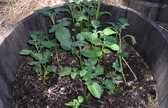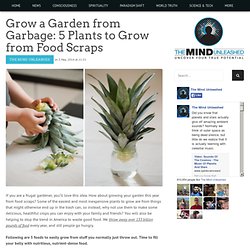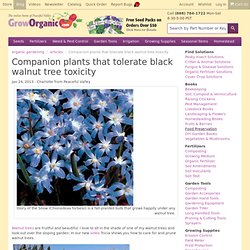

Plant These 6 Perennial Vegetables Once And Reap Their Harvest Year After Year! Grow a Garden from Garbage: 5 Plants to Grow from Food Scraps. If you are a frugal gardener, you’ll love this idea.

How about growing your garden this year from food scraps? Some of the easiest and most inexpensive plants to grow are from things that might otherwise end up in the trash can, so instead, why not use them to make some delicious, healthful crops you can enjoy with your family and friends? You will also be helping to stop the trend in America to waste good food. We throw away over 133 billion pounds of food every year, and still people go hungry. Following are 5 foods to easily grow from stuff you normally just throw out. But before getting started collecting your ‘scraps’, be sure to source them from organic fruits and vegetables, because pesticide and herbicide-treated plants usually won’t grow a second generation. 1. 2. 3. 4. 5.
You can also grow potatoes, garlic that’s started to sprout, turmeric, pineapple, and red and white onions. Credits: naturalsociety.com, where this was originally featured. 22 Unbelievably Clever Gardening Cheats. Companion plants that tolerate black walnut tree toxicity. Walnut trees are fruitful and beautiful.

I love to sit in the shade of one of my walnut trees and look out over the sloping garden. In our new video Tricia shows you how to care for and prune walnut trees. Walnut trees definitely like their own space, and can be bad neighbors to certain plants. Find out the best companion plants for walnuts. Black walnut tree toxicity Black walnut trees load their roots, buds, and nut hulls with the juglone toxin (leaves and stems have smaller amounts of juglone). But wait, you say, I don’t have a black walnut tree. Companion plants for black walnut trees Purdue University has informal lists of plants that tolerate juglone and those that are sensitive to it. Vegetables: lima bean; snap bean; beet; carrot; corn; melon; onion; parsnip; squash.
Fruits: black raspberry, cherry. Plants that are sensitive to black walnut tree toxicity Vegetables: asparagus, cabbage, eggplant, pepper, potato, rhubarb, tomato. See How One Couple Squeezes An Entire Farm Onto Their Small Los Angeles Property. Free Expert Help Through the Cooperative Extension. How many times have you found a damaged leaf in your garden and wondered what caused the damage?

Or wondered about that fruit tree that’s failing to thrive? Of course, social media allows us to ask questions of a broad cross-section of the population, but sometimes you just need an expert, and preferably someone who knows your region well. Enter the USDA. Sure, we may gripe about their policy on raw milk or their stance on transgenic crops, but there is one service of the USDA that we can happily utilize: the Cooperative Extension System. This system is available to the public and offers a variety of services, varying by state. Master Gardeners: Volunteers who have completed Master Gardener training are available to answer questions. Soil testing: Often facilitated by the university that’s tied to the Cooperative Extension office, growers can have in-depth soil testing done for a quite reasonable fee.
Search the map here to find your nearest Cooperative Extension office. Rock Beds are Beautiful but are they Functional? The first year we had a garden in this location we built raised rock beds.

We were working with our natural rocky terrain and as there are so many rocks in the ground it only made sense to build upwards. At the time we thought ‘Hey! 17 Foods To Buy Once And Regrow Forever. Everyday we throw heaps of leftovers and scraps out which could actually be used to regrow fruits, vegetables and herbs completely free of charge.

Not only can we save money, but also reduce our carbon footprint. With grocery prices increasing, now is the best time to get frugal in the kitchen and garden. Growing plants in difficult conditions, using different gardening types. Deductive Seasoning. Companion Planting. Food, Farm, Environment & Sustainability. The Best Planting Tip I Ever Received. This spring my wife and I started to convert the expanse of lawn around our newly purchased ranch house into gardens.

While we focus on renovating the insides of the house, the focus for our garden is its infrastructure and bones. To that end, we’ve been smothering several hundred square feet of lawn under cardboard, newspapers, and compost; planting young shrubs to create screens; carefully carving specimens out of overgrown trees; and generally preparing the soil for future garden spaces. Last week we installed several hundred perennials and grasses on the side of our house. During that planting, I remembered the best planting advice I’ve ever received. This advice came to me by way of a representative from Monrovia Nursery. The advice focused on techniques of installing container plants. I had known how to direct the roots away from the plant using a root hook, or by scoring the sides of the roots with a sharp blade.
13 Vegetables That Magically Regrow Themselves. Seeds - Saving, Trading, Buying. Top 16 Edible Plants You Can Grow Indoors. Top 16 Edible Plants You Can Grow Indoors Please be sure to Join our email list and receive all our latest and best tutorials daily – free!

Image – © Tomo Jesenicnik – Fotolia.com Micro gardening is all the rage and for many very good reasons! We discovered an amazing page listing 16 of the best edible plants that you can grow indoors. It is a true “mega page” with tons of useful tips – and it definitely raises the bar, so we thought it worth sharing. Many people have been discouraged from growing their own food because they think they will need a house in the country or an allotment garden – however it’s amazing what you can grow with a nice windowsill or even some “vertical gardening” techniques.
Here are some of the reasons why you might want to consider: 1) It’s the most local produce you can possibly have. The Better Food Movement.